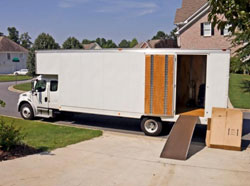 If you are planning a DIY move, it is most likely to save a little money. However, while forgoing professional moving services and tackling the task yourself may seem cost-effective, there are many expenses to consider. If you are wondering what kind of budget you'll need for a DIY move, the following guide will help you calculate expected costs so you are properly prepared.
If you are planning a DIY move, it is most likely to save a little money. However, while forgoing professional moving services and tackling the task yourself may seem cost-effective, there are many expenses to consider. If you are wondering what kind of budget you'll need for a DIY move, the following guide will help you calculate expected costs so you are properly prepared.
Truck rental
Unless you are moving the contents of a very small apartment in your own vehicle or truck, you will require a rented moving truck for your relocation. The cost of your truck rental will depend on the size you need, the distance you will travel and the length of time you require the truck. Most truck rental agencies charge a flat fee per day which varies by the size of the truck:
- 10-foot: $19.95
- 14-foot: $29.95
- 17-foot: $29.95
- 24-foot: $39.95
- 26-foot: $39.95
After this initial fee, you will be charged per mile you travel. This cost can vary depending on the time of year and even day of the week you move, but typically ranges from $0.79 to $1.29 per mile. You may also be charged a rental tax (between 6 and 10 percent of the cost of the rental) and an environmental tax, which is usually about $1 a day. If you are moving long-distance, you may also be charged an extra fee for a one-way rental.
Ask any truck rental agency you are considering for your move about all extra taxes and fees you could incur with your reservation.
Fuel
Whether you are renting a truck or moving in your own vehicle, you will have to consider the costs of fuel in your moving budget. If you are moving locally, fuel may not be a significant expense, but for long-distance moves, it can surely add up.
Truck rentals are usually provided with about a half tank of gas. No matter how much of that gasoline you burn during your move, you must replenish it before it is returned. If not, the agency will charge you for the gas anyway, and most likely at a much higher price.
 To determine what you can expect to pay in fuel for your move, calculate the miles you will travel and consider the gas costs in the regions you will pass through. You should also consider the fuel efficiency of the truck, which will be carrying a heavy load and may burn more gas than you do driving your personal vehicle.
To determine what you can expect to pay in fuel for your move, calculate the miles you will travel and consider the gas costs in the regions you will pass through. You should also consider the fuel efficiency of the truck, which will be carrying a heavy load and may burn more gas than you do driving your personal vehicle.
Insurance
If you are renting a truck for your DIY move, you should always purchase truck rental insurance to protect yourself in case of an accident. Protections plans offered will vary, but most companies offer the following:
The protection plans offered by truck rental companies vary, but they all offer some form of the following basic types of coverage:
- Damage waiver: Covers accidental damage to the rental truck and equipment due to accidents, vandalism, and sometimes theft.
- Personal accident (Medical): Provides medical and loss of life coverage to the driver (and often passengers) resulting from injury in an accident.
- Cargo coverage: Offers protection for your goods from loss or damage due to collision or natural disasters.
- Supplemental liability: Protects you from claims made by third parties for bodily harm or damage to personal property caused by a collision with your rental truck.
- Towing insurance: Covers damage to any vehicle being towed by your rental truck, as well as the towing equipment.
So how much does rental truck insurance cost? The added expense can range from about $15 to $30 a day, but will ultimately vary depending on the company you choose and the extent of your protection. Most companies offer different bundles of coverage depending on your needs. Deductibles will apply.
Packing supplies
If you will be packing and wrapping all of your own items, you will have to acquire the proper materials. Moving boxes, packing paper, bubble wrap, packing peanuts, tape, markers--these supplies are all essential to effectively protect your belongings. While you can obtain free boxes and supplies for some of your possessions, your valuable electronics, fragile glassware and other delicate items should be packed in new, professional-quality materials.
New moving boxes can vary in cost depending on size and type of container. Medium moving boxes can cost about $5 each, and specialty boxes like mirror boxes or wardrobe boxes can be about $9 each.
You can also purchase moving boxes in bundles or moving kits by the number of rooms in your home. For example, a kit for a three- to four- bedroom home (complete with supplies such as tape, labels, and bubble wrap) will cost you about $250.
There are also some essential tools needed to haul and load your furniture and appliances on moving day. Dollies, hand trucks and moving straps can all be rented from your truck rental agency. You may also need furniture blankets to wrap and protect your furniture from scratches or damage during the move.
Food and hotel stays
 If your move is long distance, you may need to make stops along your route for food and rest. These expenses can add up, so before you hit the road, research affordable eateries and motels along your route. This will help you budget more efficiently for these expenses and save time during your travel.
If your move is long distance, you may need to make stops along your route for food and rest. These expenses can add up, so before you hit the road, research affordable eateries and motels along your route. This will help you budget more efficiently for these expenses and save time during your travel.
Portable storage
If you want to balance cost with convenience, you can opt for a partial DIY move by renting a portable storage unit. Portable storage containers are delivered to your property, where you can load them with your items and furniture at your convenience (initial fees typically cover up to one month). Loading is also easier because the unit is ground level, unlike a moving truck. When loading is complete, you simply call the company and a driver will pick up the unit and deliver it either to your new home or storage facility until you are ready for it.
The cost of portable storage depends on the size of the unit, the length of time you need it, the distance of your move and the company you choose. Smaller units will cost about $100 a month, and larger units can reach up to $200 per month. You will also be charged delivery fees and mileage charges for a long distance move. Make sure to ask any portable storage company you are considering using for your move detailed questions about fees to calculate an accurate cost.